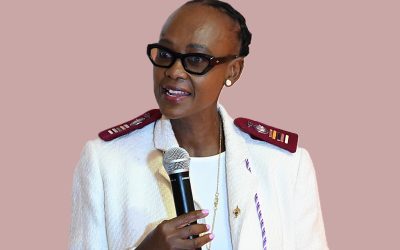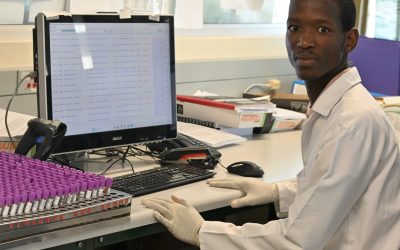Sefako Makgatho Health Sciences University (SMU) reaffirms its commitment to academic excellence and community engagement. By celebrating achievements and inspiring the next generation, the Department of Human Nutrition & Dietetics at SMU continues to shape the future of healthcare professionals in South Africa.
 The Department of Human Nutrition & Dietetics at SMU held its 2025 annual awards ceremony to recognise students who have demonstrated outstanding academic and community engagement achievements during the 2024 academic year, under the theme: “Honouring Excellence, Inspiring the Future,” the event celebrated student success while encouraging incoming first-year students to follow in the footsteps of those who excelled before them.
The Department of Human Nutrition & Dietetics at SMU held its 2025 annual awards ceremony to recognise students who have demonstrated outstanding academic and community engagement achievements during the 2024 academic year, under the theme: “Honouring Excellence, Inspiring the Future,” the event celebrated student success while encouraging incoming first-year students to follow in the footsteps of those who excelled before them.
The department has been actively involved in various initiatives throughout the past year, fostering academic excellence and community development. Notably, staff and students participated in a campus gardening project aimed at ensuring food security for students. Additionally, the department collaborated with the School of Health Care Sciences to host a mental health discussion for staff, highlighting the importance of well-being in the workplace. To enhance academic quality, all departmental modules were evaluated by students and peers, providing critical feedback for continuous improvement.
Faculty members lead by example through a commitment to professional growth, regularly attending teaching and learning workshops to stay updated with best practices. They also emphasise real-world exposure by integrating students into community work from their second year, equipping them with awareness of social challenges affecting healthcare. Looking ahead, problem-based learning (PBL) training will be implemented from the first year of study in 2025, further enriching the learning experience.
The awards recognised top-performing students across all academic levels. First-year student Fency Kekana emerged as a standout performer, credited for her consistent study habits and active class participation. “I focus on consistency over intensity, studying daily and planning my week with a to-do list,” she shares.
 Second-year students faced challenges, particularly in service modules, but received support from the Centre for University Teaching and Learning (CUTL) through tutoring and additional guidance. Despite these hurdles, students excelled, with Tshepiso Makitla receiving the Best Overall Second-Year Student Award. Encouraging her peers, she says: “Believe in yourself, prioritise your studies, and work in study groups.”
Second-year students faced challenges, particularly in service modules, but received support from the Centre for University Teaching and Learning (CUTL) through tutoring and additional guidance. Despite these hurdles, students excelled, with Tshepiso Makitla receiving the Best Overall Second-Year Student Award. Encouraging her peers, she says: “Believe in yourself, prioritise your studies, and work in study groups.”
Third-year student Nicole Novela received the Best Overall Third-Year Student Award, recognising her dedication and discipline. “This award is a testament to my commitment, and it motivates me to continue striving for excellence,” she says. Unlike the first and second-year awards, the third-year category included a Community Engagement Award, reinforcing SMU’s strategic focus on societal impact.
Guest speaker Matome Chilwane, Chairperson of the newly established Association for Dietetics in SMU (ADSMU), inspired students to take ownership of their academic and professional journeys. “Excellence is not a one-time achievement but a habit. Keep pushing beyond your limits and remember you represent this department, this university, and the future of dietetics in South Africa,” he emphasised.
Chilwane also encouraged students to engage with professionals in the field, urging them to shadow registered dietitians and seek mentorship opportunities. “By joining ADSMU, you help shape the future of our field, create opportunities, and ensure dietetics students have a strong voice,” he added.
Beyond academics, the department recognises the value of social engagement, highlighting that university life is not solely about grades. Participation in student groups, networking, and social events contributes to a well-rounded university experience.
Notably, the academic performance of third-year students has significantly improved over the past four years. Previously, it was challenging to find students achieving over 75% in a module, but today, many compete for awards with distinction marks. This improvement is attributed to faculty members’ dedication to continuous learning and professional development through workshops and training.
The Community Engagement Award is particularly valuable for students’ future career prospects, setting them apart in the competitive job market. The department ensures that even students who did not receive an award understand that hard work is always rewarded, whether through formal recognition or personal academic growth.
The department continues to foster a culture of excellence, celebrating student achievements not only at the annual awards ceremony but also at the final-year oath-taking event. At this prestigious gathering, top-performing students per module and the overall best student across all four years are recognised. Sponsors are invited to present prizes, reinforcing the message that dedication and perseverance yield tangible rewards.
By Tumelo Moila



